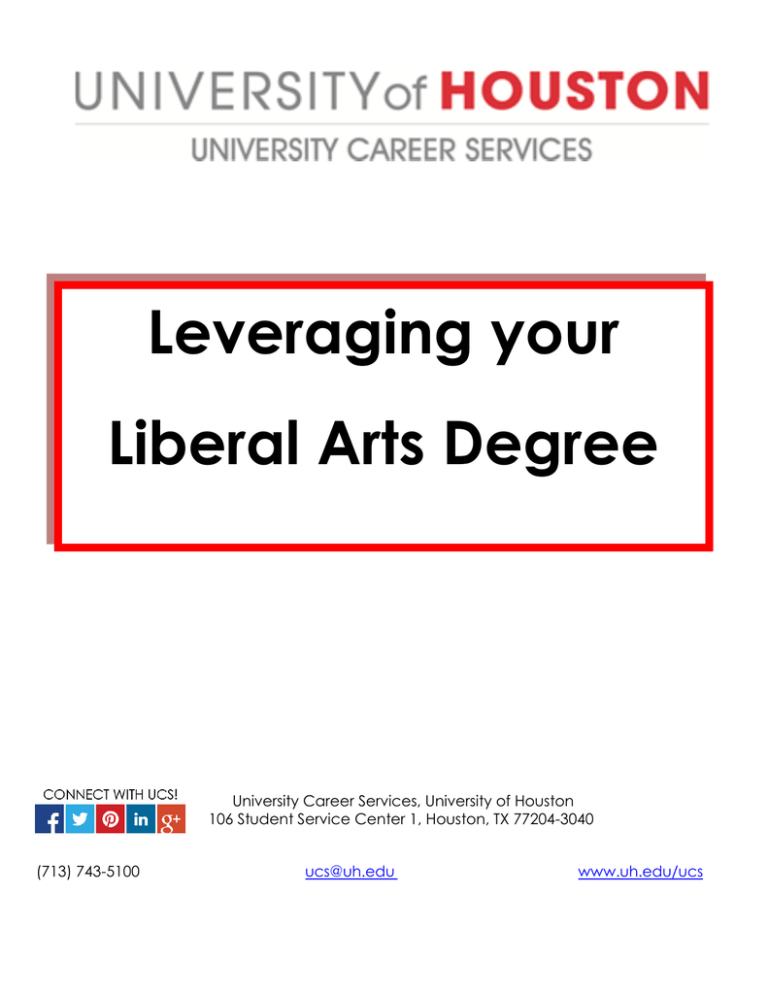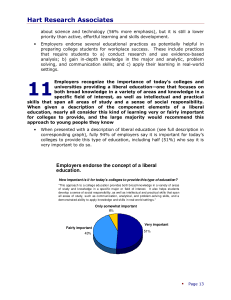Leveraging your Liberal Arts Degree
advertisement

Leveraging your Liberal Arts Degree University Career Services, University of Houston 106 Student Service Center 1, Houston, TX 77204-3040 (713) 743-5100 ucs@uh.edu 1 www.uh.edu/ucs Preparing for a Career as a Liberal Arts/Social Sciences Major Now that you have declared a major, you get to decide how successful you would like to be. The key is starting to explore your resources and yourself to find the right fit for you! The resources available at University Career Services include access to Career Counselors who can help you with your resume, interviewing skills, and to discover new ideas for your career. The Career Services Counselors can also utilize vocational assessments, such as the Myers Briggs Type Indicator and the Strong Interest Inventory, to help you identify your strengths and weaknesses, pinpoint interests, and match them with your strengths while clarifying your values. Looking at the overlap amongst your strengths, interests, and values can identify careers that correspond with them. One of the many benefits of a liberal arts degree is that you have the flexibility of careers that may be directly connected, partially connected to, or unrelated to the major. There are also handouts available on the UCS website under “Students” to help with career exploration, preparing for the job search, and preparing for interviews. A key strategy for any major is building a network. Networking involves moving beyond one’s own immediate social circle and tapping into other people’s networks, perhaps far removed from one’s own. Being able to uncover opportunities though networking is a critical job search skill, since jobs that are advertised tend to be extremely competitive. Around 7585% of jobs are never advertised, but you can find out about these positions through your network of connections in your field of interest. A way to build your network and explore the job market is to complete some informational interviews. This includes you contacting people in the field you want to pursue and learning how they got to where they are so you can get there too! This is explained in further depth in the handout “Informational interviewing and networking”. Be sure to check out our University Career Advisory Network on LinkedIn to find a willing participant! An additional technique for exploring you options is to gain experience, be it an internship, volunteer activity, or a part-time position. This will serve three purposes, (1) to give 2 you hands on experience in what you would like to do, (2) to provide valuable experience that can be relayed to potential employers, and (3) to change your career trajectory if you decide you don’t like the path you have chosen. The average college graduate changes jobs once every three years and changes career fields two or three times in a lifetime. Deflating the Myths Regarding a Liberal Arts Education There are several myths that surround choosing a liberal arts/social science major, some of which you might have already heard. “A liberal arts degree does not prepare me for the real world. I’m not qualified to do anything but teach.” Although teaching is a great job, it is not your only option. If you don’t want to teach, your career options are still wide open, and having so many opportunities can be both enlightening and challenging. An accounting major prepares you to be an accountant. Electrical engineering courses prepare a student to be an electrical engineer. A psychology major prepares you to be a _______? It is up to you to explore what career you would like to have. When you consider your interests, values, skills, you will discover a multitude of career choices! “Companies don’t hire liberal arts graduates. The only graduates they are interested in come from business or technical majors.” Though there are some positions that are filled with people that have specific technical skills or educational backgrounds, there are some employers that look beyond the coursework when they are recruiting students. They look for transferable skills, shared values, and the character of the student. With your liberal arts major, you are afforded the opportunity to develop the transferable skills and broad learning abilities that other majors tend not to develop. The secret is knowing that you have these skills and knowing how to market them on your resume and in your interview. “You need to go to grad school to get a job with a liberal arts major.” 3 You may want to consider going to graduate school to further you education, however, after exploring all possibilities for your future you may decide that graduate school is not for you or not for you right now. With or without a graduate degree a person with a liberal arts major can still find a job. You must explore yourself and your interests to find the right fit for you. University Career Services is here to help you identify your values, skills, and interests to discover your future career path! The Four W’s When you think about “Who”, “What”, “Where”, and “Why”, you begin to think outside the classroom and into the potential careers that lay before you. For help with where to start meet with your career counselor to clarify your career trajectory! WHO? Who do you want to work for? Business, government, or a non-profit organization? A small or large company? A reputable company? WHAT? What skills do you want to use the most? Organizational skills? Writing skills? Communication skills? WHERE? Where do you plan on living? Does the position require travel? WHY? Why are you interested in a particular organization or job? And how do you convey this in a job interview? Get to know your Selling Points Communication Time Management Analyzing Research Leadership Flexibility Decision Making Adaptability Attention to Detail 4 Initiative Writing Team Work Critical Thinking Creativity Positive Attitude These skills are necessary for every job; your career counselor can help you relay these skills to your resume and to your interview. Employers want to hire students who have board educational foundation, with a wide array of skills & abilities that they can tailor to fit their organization needs. Liberal arts majors don’t market to their majors, they market themselves Just getting started in your Liberal Arts Degree? 1. Whatever major you choose to study, study it well. GPA is not the only factor employers look at, but maintaining a high GPA is important 2. Take classes that reinforce your skills. Consider taking a computer class, public speaking class, a writing class, or a research-oriented class 3. Get career-related experiences- This can not be emphasized enough. Internships, part-time jobs, volunteer work, etc. Pursue any opportunity where you can to get hands-on experience in a career you are considering. The experience can help you decide on a profession that suits you and you will have the hands-on experience that employers seek when looking at candidates. 4. Get involved! This looks great on your resume and employers look for students who have gotten involved in campus or community services. Getting involved also allows you to develop your interpersonal skills and the ability to network with those who share similar interests and passions. Prepare for the job search before starting it. Take time to consider what you really want; see a career counselor to help identify what you can do with your major and the best ways to research different career options. Take advantage of every resource, there are probably more then you think. Try talking to people and start building your network. Create a professional presence on LinkedIn to help you connect with recruiters, industry professionals, and potential future colleagues. 5 What if you got started late (like the semester of graduation)? Don’t panic, your career counselors can still help you! What if you didn’t partake in any internship? Let’s say you have to market yourself to employers as a liberal-arts graduate virtually on the strength of the degree alone. 1. Be loud and proud of your degree- if you are beat down and defensive- your road will be harder. Your degree is an honor! You are sought by many employers; you have a versatile ticket to a wide range of jobs. Few jobs are out of your reach and the more you believe in the great choice of major you have chosen, the better you will be able to market yourself to employers. While other majors teach specialized skills, you are not limited by a specialization. You can be trained by your employer to get the specialized skills, but they can’t train your critical-thinking skills or problem-solving skills. 2. Sell your Passion- one unique thing that you have experienced that most others do not is that you got to choose you’re major because you truly love the subject matter. Your passion shows your enthusiasm, your love of learning, your commitment, and your dedication. 3. Sharpen your Focus- your training qualifies you for a range of careers. But avoid the “I’ll do anything” mantra. Employers want to know what you want to do, and the more focused you are, the easier it will be to land a job! Your career counselor can help you with all the resources the University Career Services has to offer including assessments, to help you hone your interests, values, and skills. 4. Your skills - know them, embrace them, and market them! You have learned skills that are universally sought by employers. You have learned to communicate effectively through writhing and speaking. The better you understand your skills and how they are valuable to potential employers- the easier it is to communicate these skills and land on a career path! 5. Give your skills a boost! If it is not too late, consider taking a MOOC, on Coursera for example, in computers or business. As a University of Houston Student, also have 6 access to over 5000 free online courses via Skillport. You can also gain exposure to business environments by conducting informational interviews. It is not too late to hone your skills; if you are looking at job postings and a specific skill keeps popping up there is probably a relatively painless way for you to get up to speed with that skill. 6. Let your resume sing your praises! You can utilize a skills based resume to outline the skills that you have learned in your degree. You may not have any hands-on experience, but you have still learned many skills that make you marketable! Your resume can be reviewed by a career counselor to make sure you stand out. 7. Chose to write a cover letter that outlines the applicability of your skills. This allows you to further narrate your skills and how they can apply to the job you are seeking. You can identify the skills that you have learned in your coursework or group projects that can make you an asset to any company. Your cover letter can be reviewed by a career counselor to make sure your presentation is clear! Overall maintain a positive attitude! So much goes into getting the degree that thinking about what to do after school can be overwhelming and it is easy to get negative. You must play an active role in your job search; take time to develop a career focus. This includes knowing the resources available to you from the Career Counselors, as well as resources on the website www.uh.edu/ucs, the University Career Advisory Network (UCAN), and workshops on various topics. The career counselors at University Career Services believe in your success if you choose to take advantage of the resources available to you! College students should have an approach to handling the challenges after graduation, not necessarily a solution because developing a career is a lifelong process. 7

